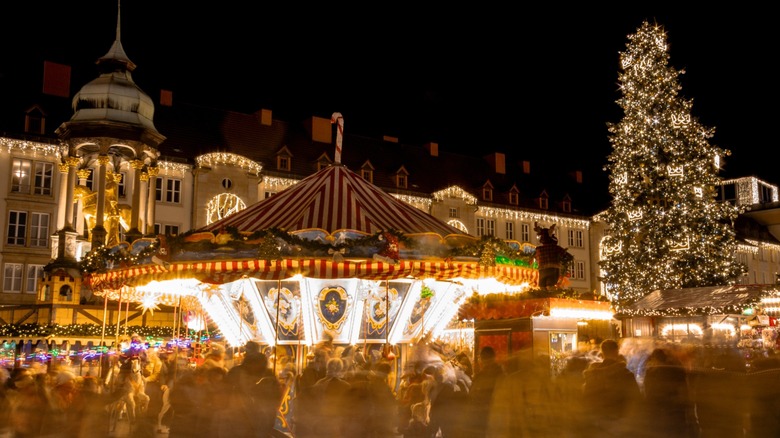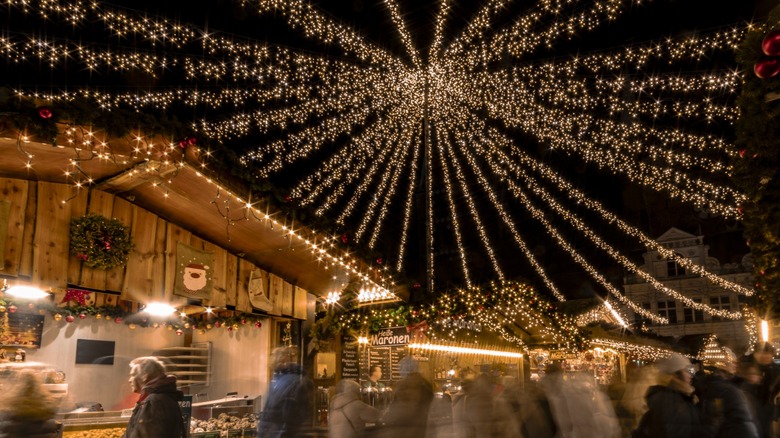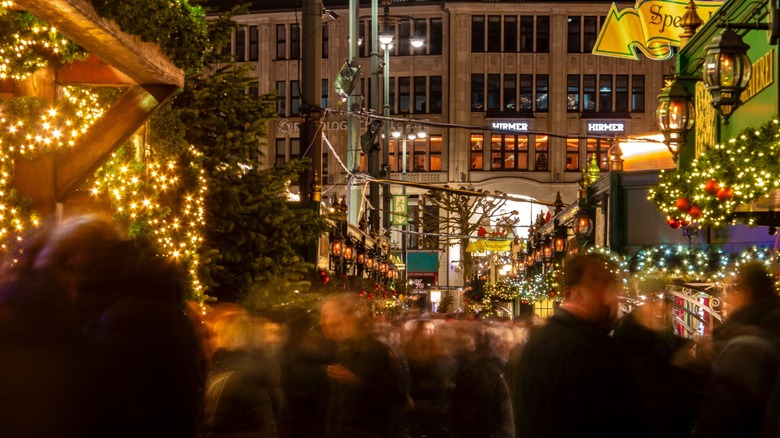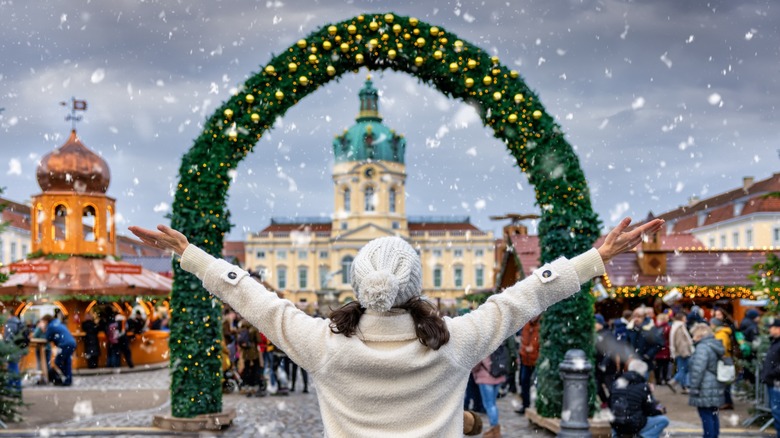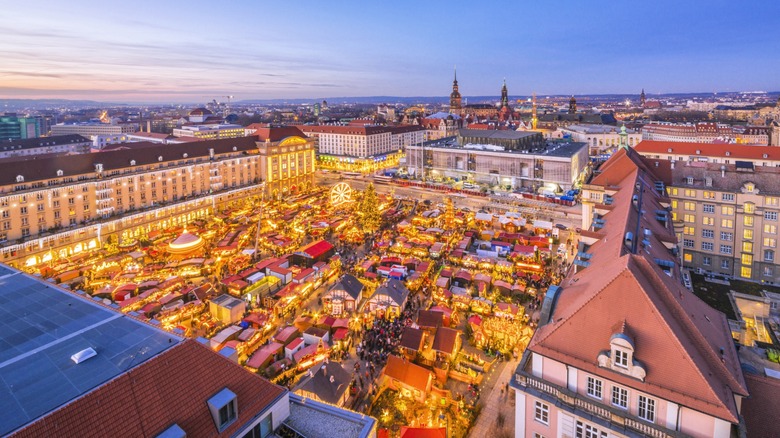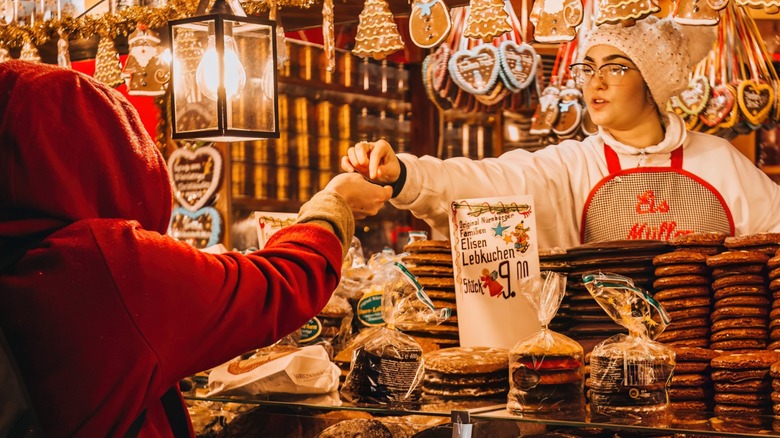5 Spectacular German Christmas Markets That Will Get You Into The Holiday Spirit
There are many reasons to pay Germany a visit: its hearty cuisine, unique festivals, and awe-inspiring historical sites, including the stunning Bavarian castle that inspired Disney. But traveling to this European nation in the winter is also an excellent way to enjoy the holiday season. The festive mood here is palpable, with decorated street lamps lining the roads, candle arches glowing from inside houses, and the brightly-lit town squares packed with merrymakers at one of Germany's most famous exports: the Christmas market.
While the date and location of the very first Christmas market is still up for debate, it is generally accepted that Germany is the birthplace of the modern-day iteration: an annually operating, Christmas-themed winter market, which dates back to the 15th century. Germany is therefore one of the best places to experience this centuries-old cultural tradition — so don't miss the opportunity to see these winter bazaars for yourself.
Head to a "Weihnachtsmarkt" and you'll be treated to exceptional regional and holiday fare, live entertainment, and vendors selling handicrafts and other artisanal goods. Yes, the weather is frigid during this time — but, as the Germans say, "There is no bad weather, only bad clothing." So pack on the layers before you start exploring. You'll quickly warm up after wandering through a delightful winter wonderland with a glass of "Glühwein" — mulled wine — in your hand.
Around 3,000 of these markets operate across the country during the holiday season, but the following are some of the most spectacular, according to research, reviews, and personal experience. Visit any one of these stunning fairs to get yourself into the holiday spirit and you'll be singing a round of "O Tannenbaum" with a heart full of Christmas cheer in no time at all.
Lübecker Weihnachtsmarkt (Lübeck)
Lübeck may not be on everyone's radar as a travel destination, as it's eclipsed by the fame of larger tourist stops like Berlin, Hamburg, and Munich. But this Baltic coastal city has plenty to offer, including its Old Town, which is a UNESCO World Heritage site brimming with gorgeous architecture and a 1,000-year history. Self-described as the "Christmas city of the north," Lübeck turns into a series of charming winter villages as the temperature drops.
Head to the Lübecker Weihnachtsmarkt, the city's traditional Christmas market — one of the oldest in the world. Located in the town square, this market is huddled below centuries-old Gothic-style brick buildings, with the backdrop of the historic Town Hall. The Lübecker Weihnachtsmarkt operates from November 25 until December 30 and is open Sunday through Thursday from 11 a.m. to 9 p.m. and until 10 p.m. on Fridays and Saturdays. While you're there, take in the smell of roasted almonds and freshly baked goods. Breathe in crisp winter air while roaming through the numerous stalls and displays of twinkling lights. And visit one of the nearby churches for an organ concert of classic Christmas repertoires under dramatic Gothic spires.
No trip to Lübeck is complete without purchasing the requisite marzipan. This delectable confectionary, said to have been invented in the city, is made from sweet almond paste and is so famous here that it even has a museum dedicated to its history and creation. The popular Christmas treat can be found in a variety of products including pralines, truffles, edible figurines, and more. You can even pick up a marzipan Advent calendar to help you count down the days to Christmas in the most delicious way.
Hamburger Weihnachtsmarkt (Hamburg)
Hamburg, a northern city-state of almost two million people, is Germany's second-biggest metropolis and largest port. Connected to the North Sea by way of the Elbe River, its harbor welcomes container ships, cruise liners, and public ferries alike. The city, which is known as the "Gateway to the World", has notoriously bad weather, with its winters marked by cold, desolate, and rainy days. Despite this, the windy, northern city transforms into a magical Christmas paradise during the coldest months.
Head to the Hamburger Weihnachtsmarkt, a historical Christmas market, if you're here for the holidays — just make sure to wrap up before going out. This enchanting winter wonderland can be found right in the city center in Rathausmarkt — the town hall square. The market is focused on sustainability, and it chooses to offer mainly fair-trade, organic, and locally produced fare in its stalls. As of 2022, it has even partnered with a specialty winemaker who only produces "Bio Glühwein" — organic mulled wine.
If you're there at 4, 6, or 8 p.m., watch Santa Claus and his reindeer fly overhead, while the jolly man in red narrates a Christmas tale for the market-goers below. Take a spin on the historical carousel, a beautiful and elegant ride that has been operating since 1932. This market runs between November 25 and December 23, between 11 a.m. to 9 p.m. every day.
Charlottenburger Weihnachtsmarkt (Berlin)
If you've booked a stay in Germany's capital, you'll never run out of activities to occupy your time. And during the holiday season, there are an even greater number of festivities to experience. Berlin alone offers more than 100 Christmas markets around the city, so you won't need to travel far in order to snag that warm cup of "Glühwein." Many of them can be easily accessed by public transportation, including the one at Alexanderplatz, which is right in the city center and is Berlin's busiest market.
Charlottenburger Weihnachtsmarkt, which is located in the west of Berlin, is particularly special, as it is lies in front of the exquisite Charlottenburg Palace. This Baroque beauty was completed in 1699 as a summer residence for Sophie Charlotte, the Prussian queen who sadly died at the age of 36 in 1705. In the winter, the grounds of the palace transform into a magnificent market for all.
Walk in the footsteps of Queen Charlotte, for whom the palace was named, and the Hohenzollern (a dynasty of nobles who resided here). Surround yourself with the sweet scents of candied apples and fresh gingerbread below the dreamy backdrop of a world-famous palace (which you can also visit in the winter Tuesday through Sunday, from 10 a.m. to 4:30 p.m.). If you're traveling with children, they can enjoy a variety of rides near the old orangery, including merry-go-rounds, small rollercoasters, and a Ferris wheel. The market runs from November 25 to December 29, with different operating hours depending on the day.
Dresdner Striezelmarkt (Dresden)
In the east of Germany is Dresden, a cultural gem with a host of art museums and architectural marvels, including the Church of Our Lady and the Zwinger Palace. Additionally, it is the site of the Dresdner Striezelmarkt, which is the oldest known continuous Christmas market in the world. It first appeared on Christmas Eve in 1434, when it was held as a small, one-day event. Now, six centuries later, it attracts visitors from all over the globe and runs for nearly a month. Set in the picturesque Altmarkt — the old market square — this market pays tribute to industries found in the Saxon province of eastern Germany, including wood-carving and wood-turning. You'll be able to purchase local pottery and handicrafts made by artisans from the Erzgebirge (Ore Mountains). You'll also find "Christstollen" (sometimes shortened to "Stollen"), a famous German fruitcake. Dresden is the home of this popular Christmas staple, whose history dates back to medieval times and which used to be served to kings as a royal gift.
At the market, be sure to grab a loaf of "Stollen" for later, and share this festive treat with your family or friends. Meander around the many stalls to find the perfect gift, like a traditional Herrnhut Christmas star. And ride the historic Ferris wheel for an excellent aerial view of the city and the market lights below. The Dresdner Striezelmarkt is open daily from 10 a.m. to 9 p.m. The festivities kick off on November 27 at 4 p.m. and end on Christmas Eve at 2 p.m.
From Dresden, you're an hour west of one of Germany's prettiest national parks, the Nationalpark Sächsische Schweiz, so plan a day trip here to see some unique landscapes.
Nürnberger Christkindlesmarkt (Nuremburg)
If you're heading to the south, a visit to the Nürnberger Christkindlesmarkt in Nuremberg, Bavaria's second-largest city, is a must. The name comes from the Christkind figure, a traditional Christmas gift-bearer popularized in the 16th century. Depicted as a young woman with wings and a golden crown, the Christkind Angel at this market is a special Christmas ambassador selected out of a pool of teenage-girl applicants. You may catch sight of her if you attend the opening ceremony — but don't take pictures unless you're willing to donate (typically to a children's charity).
Here you'll find a variety of scrumptious regional specialties and handicrafts for sale. Don't leave without trying the Nuremburg bratwurst and "Lebkuchen," a spiced cake similar to gingerbread. Make sure to buy a "Rauschgoldengel", a handmade gold-foil angel tree-topper. And if you're up for a souvenir that's both weird and wonderful, pick up a "Zwetschgenmännle", a figurine made of dried prunes, which allegedly brings prosperity and happiness to your household. The Christkindlesmarkt runs from November 29 (opening ceremony at 5:30 p.m.) to December 24 (closes at 2 p.m.) with daily operating hours of 10 a.m. to 9 p.m.
The above is by no means a comprehensive list — there are thousands of options to choose from, and you can even visit some of the best European Christmas markets on a luxurious river cruise. If you're planning a wintertime stay in Germany but won't be in any of the aforementioned cities, don't worry. You'll still be able to kindle that holiday feeling in any market. So check out the dates and times for the one nearest you, pack your camera and some warm clothing, and go experience a little of that Christmas magic for yourself. Frohe Weihnachten!
